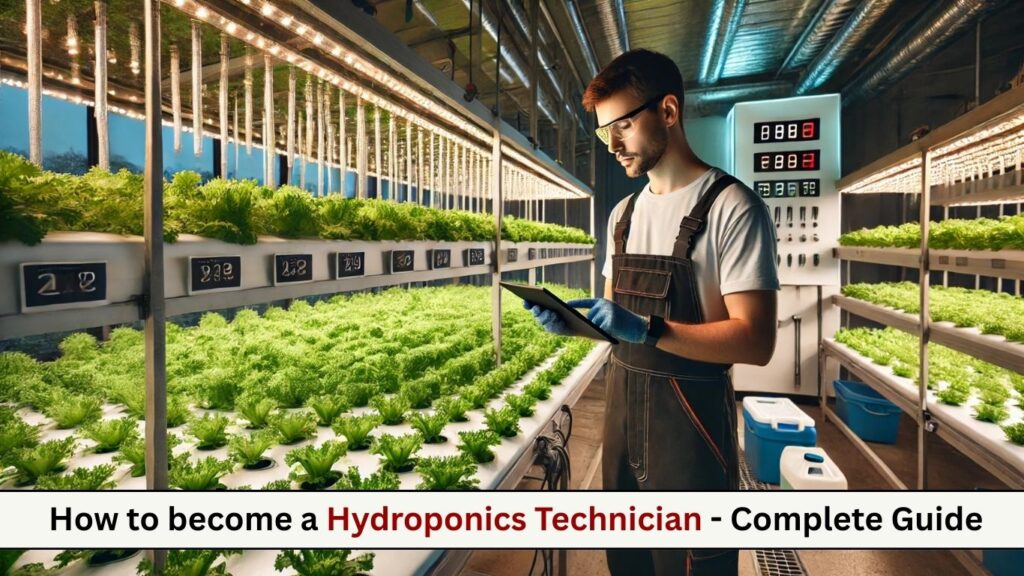
Introduction to Hydroponics Technology
Hydroponics technicians are revolutionizing agriculture by growing plants without soil using nutrient-rich water solutions. As urban farming and sustainable agriculture gain momentum, hydroponics professionals are in high demand globally.
This comprehensive guide covers:
- Historical evolution of hydroponics
- Core responsibilities of technicians
- Global salary benchmarks
- Essential qualifications and certifications
- Step-by-step career entry
- Future trends in soilless farming
History of Hydroponics
The concept of soilless cultivation dates back centuries:
Key Historical Developments
- 600 BCE: Hanging Gardens of Babylon (early hydroponic system)
- 1600s: Scientists discover plants absorb nutrients from water
- 1929: Dr. William Gericke coins term “hydroponics”
- 1940s: U.S. military uses hydroponics to feed troops
- 1970s: NASA begins hydroponic research for space missions
- 2000s: Commercial vertical farms emerge globally
- 2020s: AI-powered hydroponic systems gain popularity
Roles and Responsibilities
Hydroponics technicians manage all aspects of soilless growing systems:
Primary Duties
- System Maintenance
- Monitor pH and EC levels
- Adjust nutrient solutions
- Clean and sterilize equipment
- Crop Management
- Transplant seedlings
- Monitor plant health
- Implement pest control
- Environmental Control
- Manage lighting systems
- Regulate temperature/humidity
- Optimize airflow
- Data Collection
- Track growth metrics
- Document yields
- Troubleshoot issues
Work Environments
- Commercial hydroponic farms
- Urban vertical farms
- Research facilities
- Greenhouse operations
- Cannabis cultivation facilities
- Educational institutions
Salary and Career Outlook
Compensation varies by experience and employer type:
2024 Salary Benchmarks
| Country | Entry-Level | Experienced | Senior-Level |
|---|---|---|---|
| USA | $35,000 | $50,000 | $70,000+ |
| Canada | CAD 40,000 | CAD 55,000 | CAD 75,000+ |
| UK | £22,000 | £32,000 | £45,000+ |
| Australia | AUD 50,000 | AUD 70,000 | AUD 90,000+ |
| UAE | AED 60,000 | AED 90,000 | AED 120,000+ |
Job Growth: The hydroponics market is projected to grow at 12.1% CAGR (2023-2030), creating abundant opportunities.
Qualifications and Skills
A mix of education and hands-on training is essential:
Educational Pathways
- Minimum Requirements:
- High school diploma with on-job training
- Associate degree in Horticulture
- Preferred Qualifications:
- Bachelor’s in Hydroponics/Agriculture
- Controlled Environment Agriculture certificates
- Valuable Certifications:
- Certified Hydroponics Technician (CHT)
- Urban Farming Professional Certificate
- Aquaponics Association Certification
Essential Skills
- Technical Knowledge: Nutrient chemistry, system design
- Problem-Solving: Diagnosing plant health issues
- Attention to Detail: Precise measurement and monitoring
- Mechanical Aptitude: Equipment maintenance/repair
- Data Analysis: Interpreting sensor readings
How to Become a Hydroponics Technician
Step 1: Build Foundational Knowledge
- Take online courses (Coursera, Udemy)
- Read hydroponics manuals and guides
- Visit local hydroponic farms
Step 2: Gain Hands-On Experience
- Start small home system
- Volunteer at community gardens
- Complete internships at commercial farms
Step 3: Earn Certifications
- Basic hydroponics certification
- Food safety training
- Equipment-specific training
Step 4: Develop Specializations
- Vertical farming systems
- Organic hydroponics
- Cannabis cultivation
Step 5: Advance Your Career
- Move into supervisory roles
- Start consulting business
- Transition to system design
Future of Hydroponics Technology
The industry is evolving rapidly with new innovations:
Emerging Trends
- Smart Farming:
- IoT sensor networks
- AI-powered nutrient dosing
- Automated climate control
- Space Agriculture:
- NASA hydroponic research
- Lunar/Martian farming concepts
- Sustainable Solutions:
- Water-recycling systems
- Renewable energy integration
- Local food production
Growth Areas
- Medical cannabis production
- Urban vertical farms
- Restaurant-integrated systems
- Disaster relief farming
Conclusion
Hydroponics technology offers a future-proof career at the intersection of agriculture and innovation. As global food systems transform, skilled technicians who combine plant science knowledge with technical abilities will be invaluable.
Start small, keep learning, and grow your career in this exciting field that’s reshaping how we feed the world.













Post Comment